




Are you tired of leftover spots and streaks on your dishes after running them through the dishwasher? Do you want to find a better alternative to the often expensive dishwasher rinse aid sold in stores? You’re not alone!
One key component to a clean, spot-free finish is the rinse aid. An essential part of the dishwashing process, it helps water sheet off dishes and glassware, preventing water spots and residue from drying on. While commercial rinse aids can be effective, making your own can be a more affordable and eco-friendly option.
In this article, we’ll show you how to make your own DIY rinse aid using simple ingredients you may already have at home. Our recommended rinse aid recipe incorporates the power of white vinegar, a popular cleaning agent known for its acidity and ability to dissolve mineral deposits.
To make your own rinse aid, you will need the following ingredients:
- 1 cup white vinegar
- 1 cup water
- 30 drops of essential oils (such as lemon or eucalyptus) for a pleasant scent
First, mix the white vinegar and water together in a container, making sure to dissolve any leftover residues. Then, add the essential oils to create a personal touch and pleasant aroma. Stir the mixture until well combined.
When you’re ready to use the rinse aid, make sure your dishwasher’s rinse aid dispenser is empty. Pour the homemade rinse aid into the dispenser, following your dishwasher manufacturer’s recommendations. The mixture will lower the surface tension of the water, helping it sheet off your dishes and leaving them spot-free.
Now it’s time to put our DIY rinse aid to the test in your dishwasher! Run a load of dishes, checking for clean and spotless results. We hope this economical and eco-friendly alternative will work wonders for you, just as it has for many other people.
Remember, if you’re wondering about the name behind this DIY rinse aid, it comes from Kris Missett-King, who recommended the recipe in a news article. Kris believes that using this homemade rinse aid is not only better for your dishes but also for the environment.
So why not give it a try and see the improvement for yourself? With this easy step-by-step guide, you can make your own homemade dishwasher rinse aid, saving money, and lowering your environmental impact. Say goodbye to leftover spots and hello to clean, sparkling dishes!
Why Use Dishwasher Rinse Aid?
When it comes to dishware, we all want our plates and glasses to be spotless and shiny, right? Well, sometimes even though we use a high-quality dishwasher detergent, we still end up with spots and streaks on our dishware after washing. This is where dishwasher rinse aid comes in.
Dishwasher rinse aid is a missett-king ingredient that is designed to be used in the final rinse cycle of your dishwasher. It helps to reduce the water droplets that are left behind on your dishes, which can result in spots and streaks. Even though nearly all modern dishwashers have a built-in rinse aid dispenser, using an additional rinse aid can have a big impact on the cleanliness of your dishware.
While there are harsh chemicals in some dishwasher rinse aids, there are also more natural alternatives available. If you’re going for a more frugal approach, you may have wanted to try making your own dishwasher rinse aid at home. Thanks to the power of the internet, you can find numerous recipes and articles on how to make your own rinse aid using ingredients you may already have at home. However, be cautious about pouring lemon, eucalyptus, or alcohol directly into your dishwasher, as these substances can potentially damage your dishwasher’s drain system or the internal components of your appliance.
Anyway, back to the topic at hand. Dishwasher rinse aid works by acting as a binder, which helps to prevent water from pooling and leaving spots on your dishes. The rinse aid typically contains surfactants that help the water to flow off the dishes and glasses more easily, resulting in a cleaner and shinier surface. In addition to reducing spots and streaks, dishwasher rinse aid can also help to prevent water spots on your glassware.
If you’re concerned about using a rinse aid because of the chemicals or potential harm they may cause, there are more natural alternatives you can try. Some people have had success using white vinegar or citric acid as a DIY rinse aid. These substances can help to dissolve any remaining soap residue and leave your dishes clean and shiny. Just be sure to check the manufacturer’s instructions for dishwasher-safe alternatives before using them.
So, here’s a collection of the benefits of using dishwasher rinse aid:
- Reduces spots and streaks on your dishware
- Prevents water spots on your glassware
- Helps to dissolve any remaining soap residue
- Leaves your dishes clean and shiny
While dishwasher rinse aid may not be a necessity for everyone, it can be a great aid for keeping your dishware looking its best. Whether you choose to use a store-bought rinse aid or make your own, the proof is in the results – cleaner and shinier dishes!
Benefits of Using Rinse Aid for Your Dishwasher
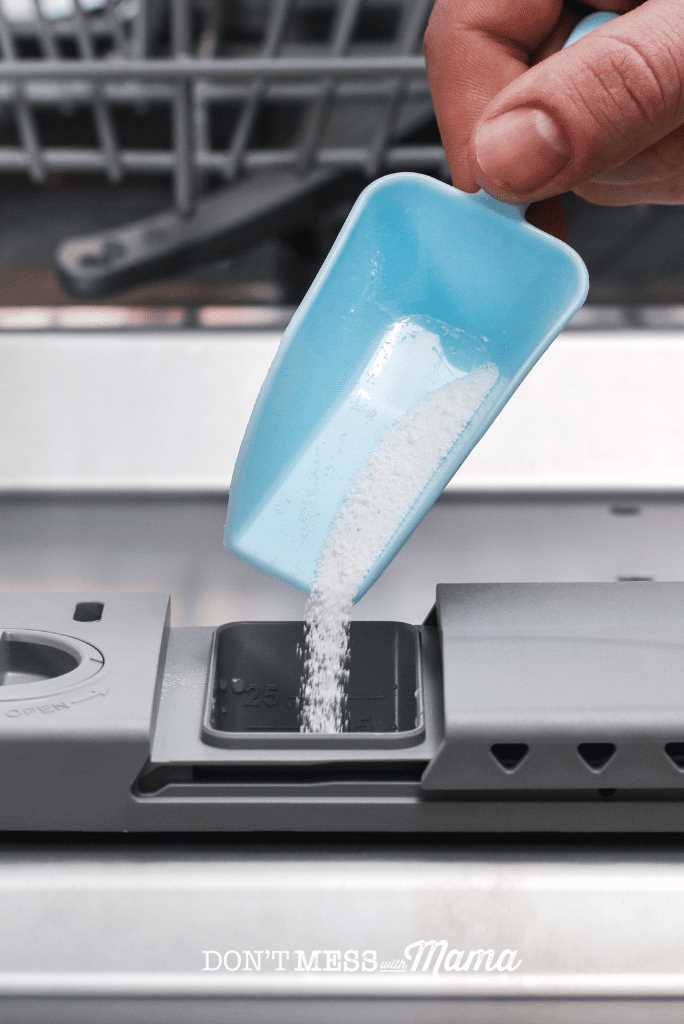
Rinse aid is an essential ingredient for anyone seeking perfectly spotless dishware once they come out of the dishwasher. It serves as the final proof of a well-done washing job, ensuring that no water spots or residue are left behind.
Here are some of the main benefits of using rinse aid for your dishwasher:
- Spotless Dishes: One of the primary benefits of using rinse aid is that it helps to prevent water spots on dishes. It ensures that your dishware comes out sparkling clean and spot-free, even when washed in hard water.
- Improved Drying: Rinse aid helps to improve the drying process during the dishwasher’s cycle. It aids in faster evaporation of the water, resulting in dry dishes and utensils.
- Reduced Stains: Rinse aid is especially useful for removing stains caused by certain foods, such as tomato sauce or tea. It helps to prevent discoloration and keeps your dishes looking new for longer.
- Prevents Residue Build-up: Rinse aid helps to prevent mineral and food residue from building up on dishes and utensils. This is particularly important for stainless steel dishware, as it can help maintain its shine and prevent corrosion.
Using rinse aid in your dishwasher also has other benefits:
- Cost-effective: Making your own homemade rinse aid is a frugal choice and can save you money in the long run. You can easily mix your own rinse aid using natural ingredients found in your pantry, such as vinegar and citric acid.
- Environmentally Friendly: Homemade rinse aid is a more natural alternative to store-bought options. It does not contain harsh chemicals that can be harmful to the environment or your health.
- Easy to Use: Using rinse aid is simple and straightforward. You just need to pour it into the designated rinse aid receptacle in your dishwasher, and it will be dispensed automatically during the wash cycle.
- Multi-purpose: Rinse aid can also have other household uses. It can be added to your laundry to help soften fabrics and reduce static cling.
So, if you want to achieve spotless and sparkling clean dishes every time, using rinse aid in your dishwasher is highly recommended. Give it a try and experience the benefits for yourself!
Ingredients for DIY Dishwasher Rinse Aid
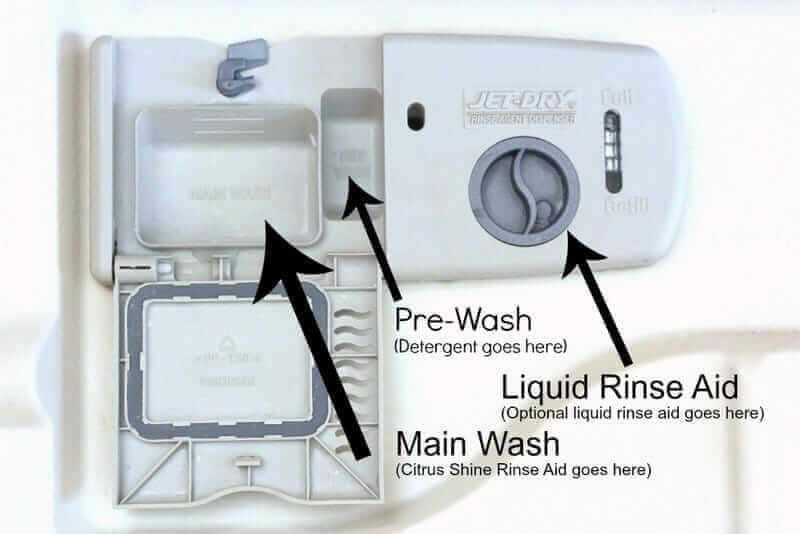
If you’re tired of spending too much money on store-bought rinse aids for your dishwasher, or if you’re looking to live a more eco-friendly lifestyle, making your own dishwasher rinse aid at home is a great alternative. The best part is that it uses simple ingredients that you likely already have in your pantry.
Vinegar
Vinegar is a popular and widely available ingredient for DIY dishwasher rinse aids. It helps to cut through grease and hard water deposits, leaving your dishes sparkling clean. You can use either white vinegar or apple cider vinegar for this purpose.
Lemon Juice
Lemon juice is another great substitute for commercial dishwasher rinse aids. It not only helps to remove stains and spots from your dishware, but it also leaves a fresh, citrusy scent. You can use either fresh lemon juice or bottled lemon juice.
Citric Acid
Citric acid is a natural component found in many foods, such as lemons and oranges. It is often used for its cleaning properties and can help to remove tough stains and grime from your dishes. You can purchase citric acid in powder form from most grocery stores or online.
Hydrogen Peroxide
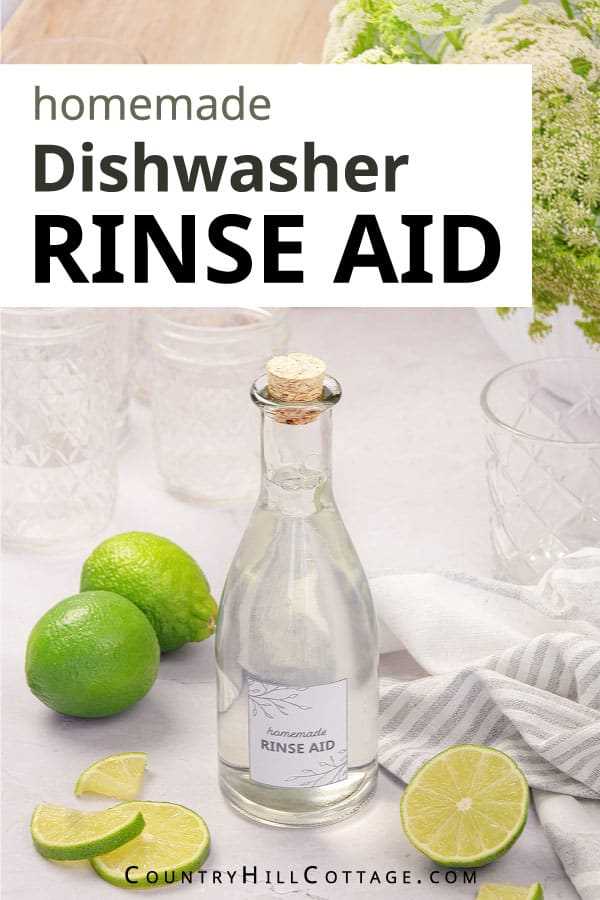
Hydrogen peroxide is a common household ingredient that has many uses, including as a dishwasher rinse aid. It helps to remove stains and sanitize your dishes, leaving them clean and spotless. Make sure to use food-grade hydrogen peroxide for this purpose.
Essential Oils (optional)
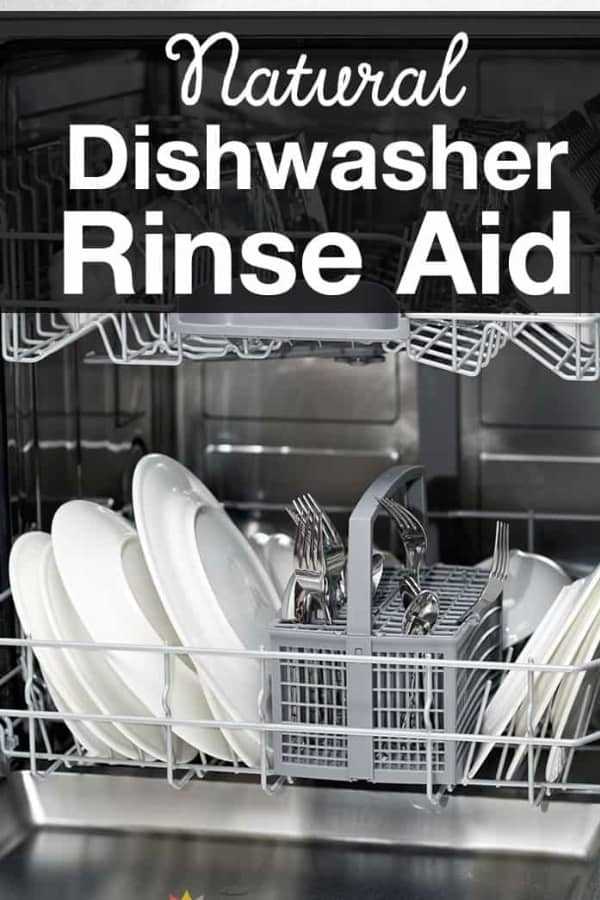
If you want to add a pleasant scent to your DIY rinse aid or if you have specific preferences, you can add a few drops of your favorite essential oil. Some popular choices include lavender, lemon, and orange essential oils.
Water
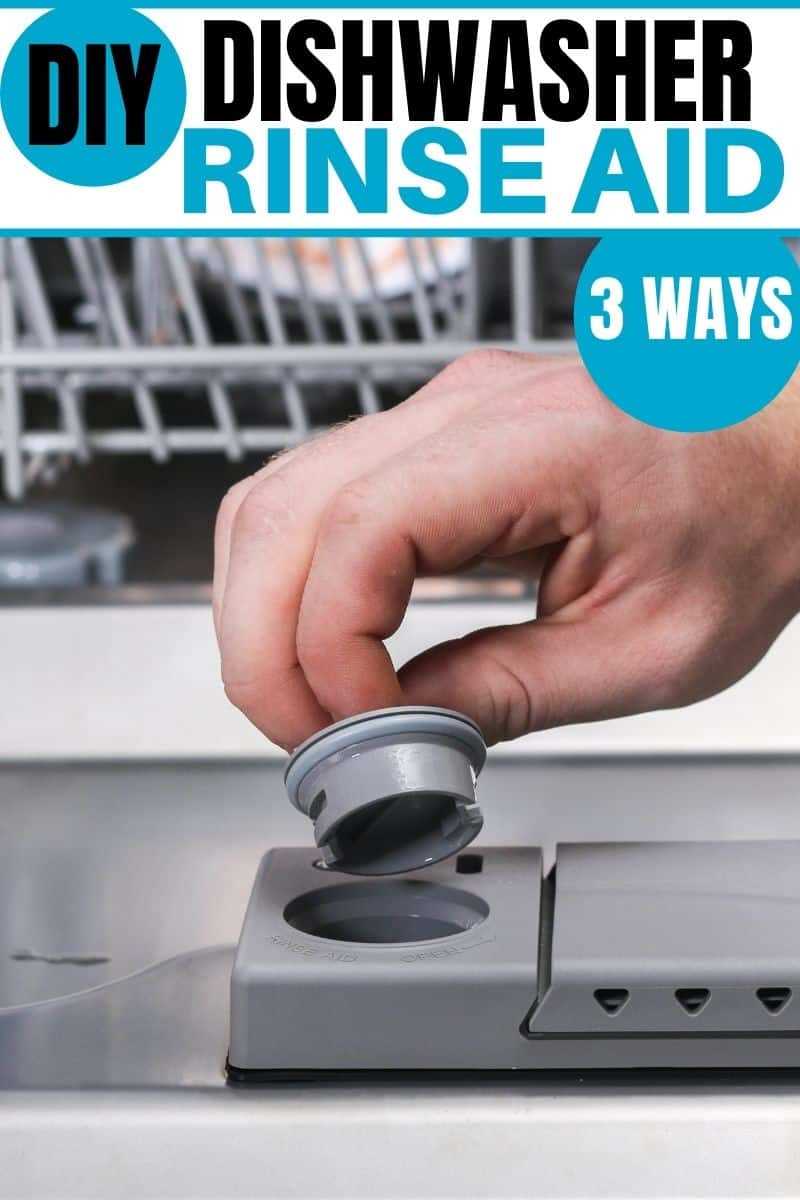
Water is a crucial component of any DIY dishwasher rinse aid mixture. It helps to dilute the other ingredients and allows for easy spreading and rinsing during the dishwasher cycle. Make sure to use clean, filtered water for the best results.
By using these simple ingredients, you can create an effective and eco-friendly rinse aid for your dishwasher. Just mix them together in the right proportions, and you’re good to go!
Simple and Natural Ingredients for Homemade Rinse Aid
When it comes to washing your dishes at home, there is always the option of making your own dishwasher rinse aid. Not only does this save you money, but it also allows you to control what goes into the products you use in your home. Plus, homemade rinse aid can be just as effective as store-bought ones.
The Ingredients
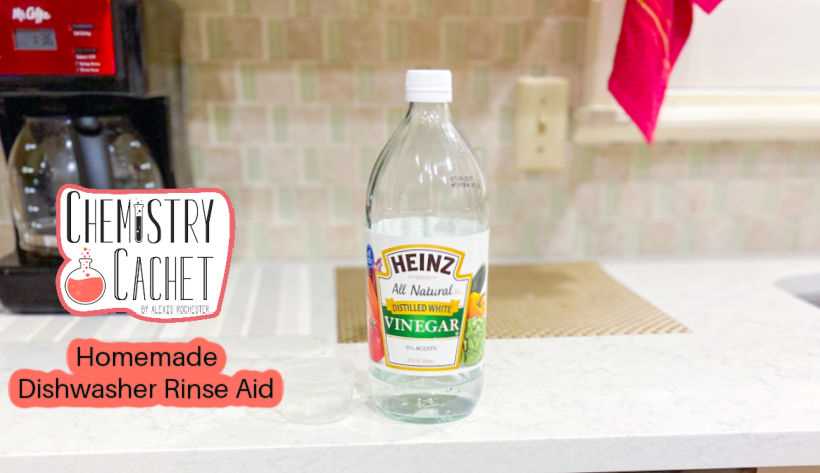
Here are some simple and natural ingredients that you can use to make your own dishwasher rinse aid:
- Vinegar: Vinegar is a staple in most households and is an excellent cleaning agent. It helps to remove grease and food residues from your dishes, leaving them sparkling clean.
- Lemon Juice: Lemon juice adds a refreshing scent to your homemade rinse aid. It also helps to cut through grease and leaves your dishes looking and smelling fresh.
- Essential Oils: Essential oils, such as lavender or tea tree oil, can be added to your rinse aid to give it a pleasant aroma. They also have antibacterial properties and can help to disinfect your dishware.
- Hydrogen Peroxide: Hydrogen peroxide is a natural bleach and can help to remove stains and disinfect your dishes. It is safe to use in your dishwasher, but make sure to dilute it properly.
How to Make Your Own Dishwasher Rinse Aid
Making your own dishwasher rinse aid is simple and only takes a few minutes. Here’s how you can do it:
- Mix equal parts of vinegar and water in a container. You can adjust the ratio depending on the potency you need.
- Add a few drops of lemon juice or your preferred essential oil for added freshness.
- If desired, you can also add a small amount of hydrogen peroxide to boost the cleaning power.
- Give the mixture a good stir to ensure all the ingredients are well combined.
- Transfer the homemade rinse aid to a clean bottle or dispenser that fits in your dishwasher’s rinse aid compartment.
That’s it! You now have your very own homemade dishwasher rinse aid that works just as well as store-bought products. Simply fill up your dishwasher’s rinse aid compartment with the homemade solution and enjoy sparkling clean dishes.
Some Tips and Alternatives
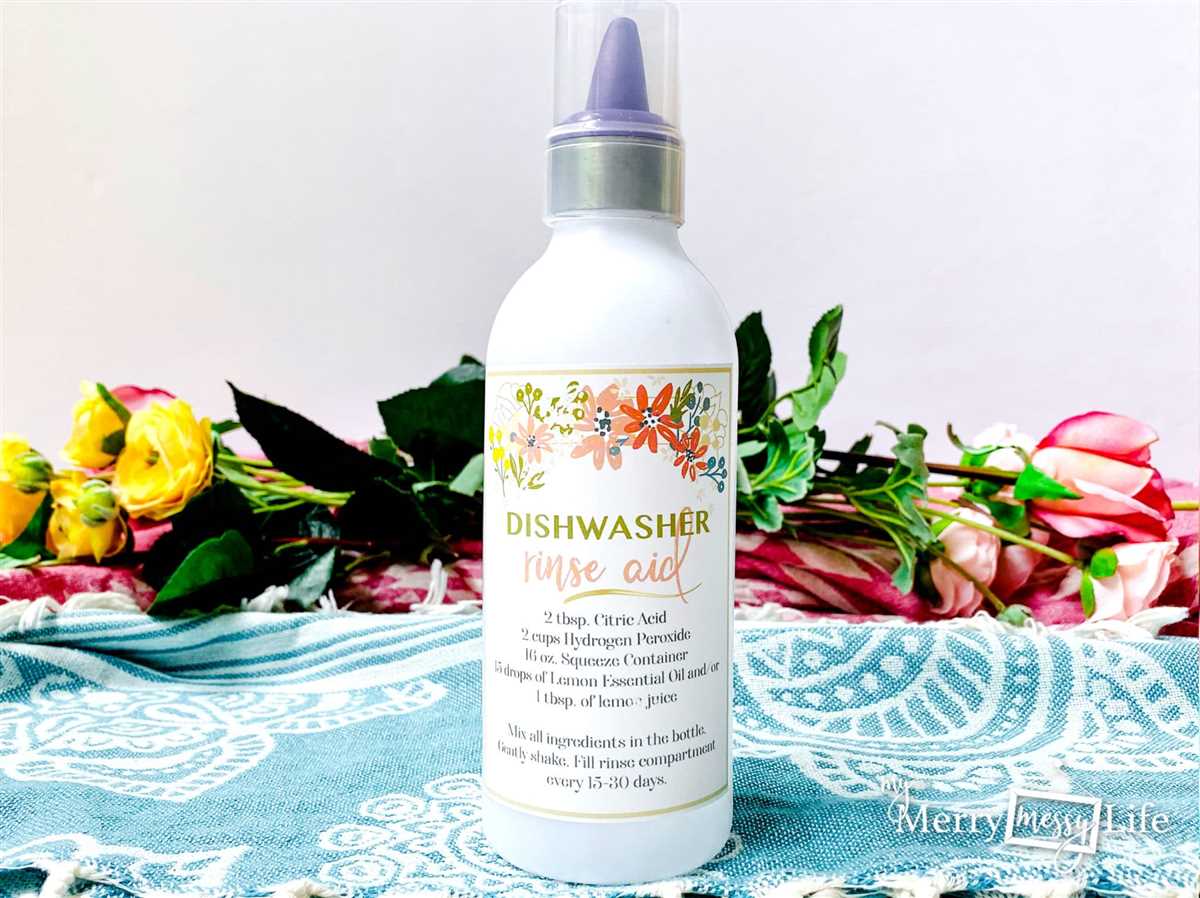
Here are some additional tips and alternatives to keep in mind when using homemade rinse aid:
- It’s always a good idea to test your homemade rinse aid on a small load of dishes before using it on your entire dishwasher load.
- If you find that your homemade rinse aid leaves streaks or spots on your glassware, you can try adding a small amount of white vinegar to the solution.
- For an extra boost of cleaning power, soak your dishes in the homemade rinse aid before running them through the dishwasher.
- Remember to keep an eye on the levels of your homemade rinse aid in the dishwasher dispenser and refill as necessary.
- While homemade rinse aid is generally safe to use, it’s always a good idea to check your dishwasher’s manual for any specific recommendations or warnings.
In conclusion, making your own dishwasher rinse aid at home is a simple and eco-friendly solution that not only saves you money but also ensures that you are using products with natural ingredients. Give it a try, and enjoy the benefits of sparkling clean dishes!
DIY Dishwasher Rinse Aid Recipe
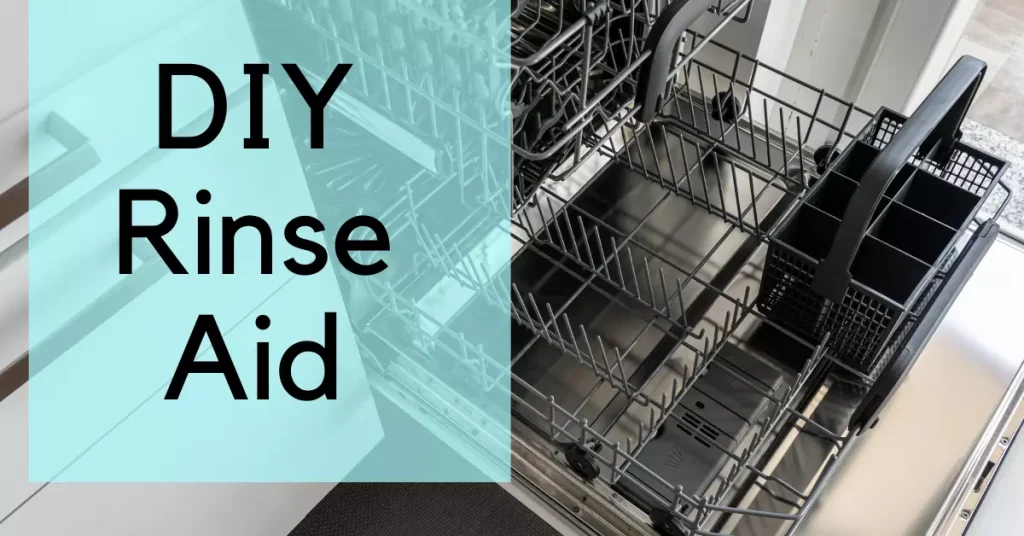
- Do you find that your dishwasher doesn’t always leave your dishes sparkling clean? Maybe it’s time to make your own dishwasher rinse aid.
- Commercial rinse aids can be expensive and often contain chemicals that you may not want on your dishware. By making your own, you can ensure that you are using a safer and more natural alternative.
Ingredients:
- White vinegar
- Lemon juice
- Isopropyl alcohol (optional)
Instructions:
- Start by cleaning your dishwasher and removing any debris that may be present in the dishwasher filter or spray arms. A clean dishwasher will ensure optimal performance.
- Mix 1 cup of white vinegar with 1 cup of water in a glass jar or other container. This solution is great for cleaning and acts as a natural emulsifier.
- If you want to add a fresh scent to your dishwasher, you can squeeze in some lemon juice as well. Lemon juice not only makes your dishwasher smell fresh, but it also helps to remove any odors that may be present.
- If you’re looking for an extra boost of cleaning power, you can add ½ cup of isopropyl alcohol to the mixture. This will help to remove any stubborn residue and leave your dishes sparkling clean.
- Once your rinse aid solution is ready, fill-up your dishwasher’s rinse aid dispenser. If your dishwasher doesn’t have a rinse aid dispenser, you can use a dishwasher-safe container and place it in the top rack of your dishwasher.
- Run your dishwasher as usual, and you will notice that your dishes come out cleaner and spotless. The rinse aid solution helps to prevent water spots and residue from forming, even on glassware.
Benefits of DIY Dishwasher Rinse Aid:
- Using a homemade rinse aid not only helps to improve cleaning performance, but it also saves you money compared to buying commercial alternatives.
- The natural ingredients used in this DIY recipe are safer for the environment and your household.
- White vinegar and lemon juice are excellent natural cleaning agents that effectively remove limescale and grease from your dishes.
- Isopropyl alcohol can help to dissolve tough stains and provides extra disinfection properties.
- This homemade rinse aid lets you take control of what you’re putting in contact with your dishes.
Printable Recipe:
| Ingredient | Amount |
|---|---|
| White vinegar | 1 cup |
| Lemon juice (optional) | Squeeze of fresh lemon juice |
| Isopropyl alcohol (optional) | ½ cup |
Step-by-Step Guide to Making Your Own Rinse Aid
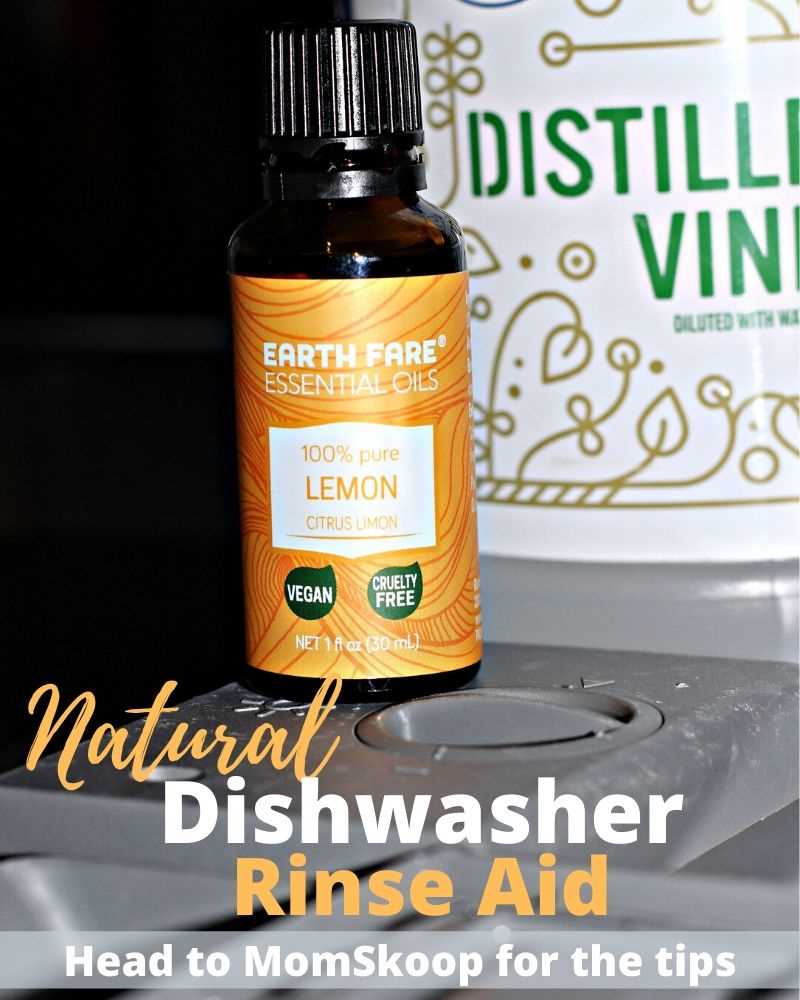
Making your own rinse aid for your dishwasher is not only cost-effective but also environmentally friendly. By using natural ingredients and avoiding harsh chemicals, you can keep your dishes sparkling clean without any negative impact on the environment. Follow this step-by-step guide to make your own rinse aid:
- Start by gathering all the necessary ingredients. You will need:
- 2 cups of citric acid
- 2 cups of hydrogen peroxide
- 10 drops of eucalyptus essential oil
- 1 empty spray bottle
- Mix the citric acid and hydrogen peroxide in a bowl. These two natural ingredients will work together to clean your dishware and leave them with a streak-free shine.
- Add the eucalyptus essential oil to the mixture. This oil not only adds a pleasant aroma but also has antibacterial properties.
- Transfer the mixture to an empty spray bottle. This will make it easier to apply the rinse aid to your dishwasher.
- Before each use, shake the bottle well to ensure that all the ingredients are mixed properly.
- When you are ready to use the rinse aid, simply spray a small amount onto your dishware before placing them in the dishwasher.
- Run your dishwasher as usual, and enjoy the benefits of your homemade rinse aid. Your dishes will come out sparkling clean and without any residue.
Making your own rinse aid not only saves money, but it also allows you to have full control over the ingredients you use. Store-bought rinse aid products often contain harsh chemicals that can be damaging to both your dishware and the environment. By using natural ingredients, you can provide a nourishing and cleaner wash for your dishes.
Natural Alternatives to Commercial Rinse Aid
- Rinse aids are often used in dishwashers to help eliminate water spots and improve drying.
- However, many commercial rinse aids contain chemicals that can be harmful to the environment and to a person’s health.
- If you’re looking for a more environmentally friendly and natural alternative, here are some options to consider:
1. Distilled White Vinegar
One of the easiest and most cost-effective natural rinse aids is distilled white vinegar. It helps to dissolve mineral deposits and prevent water spots.
Simply fill your dishwasher’s rinse aid dispenser with vinegar and run your dishwasher as usual. The vinegar will help to leave your dishes clean and spot-free.
2. Citric Acid
Citric acid is another natural alternative to commercial rinse aids. It can be found in the form of a powder or as concentrated lemon juice.
Add about half a teaspoon of citric acid powder or a few drops of lemon juice to your dishwasher’s rinse aid dispenser, and run your dishwasher as normal. Citric acid helps to cut through grease and leaves your dishes sparkling clean.
3. Essential Oils
If you prefer a fresh scent in your dishwasher, you can add a few drops of essential oils to your rinse aid dispenser. Some popular choices include lemon, orange, and lavender.
Make sure to choose high-quality oils and use them sparingly. Essential oils are potent and may leave a lingering scent on your dishes if used in high quantities.
4. Homemade Rinse Aid Recipe
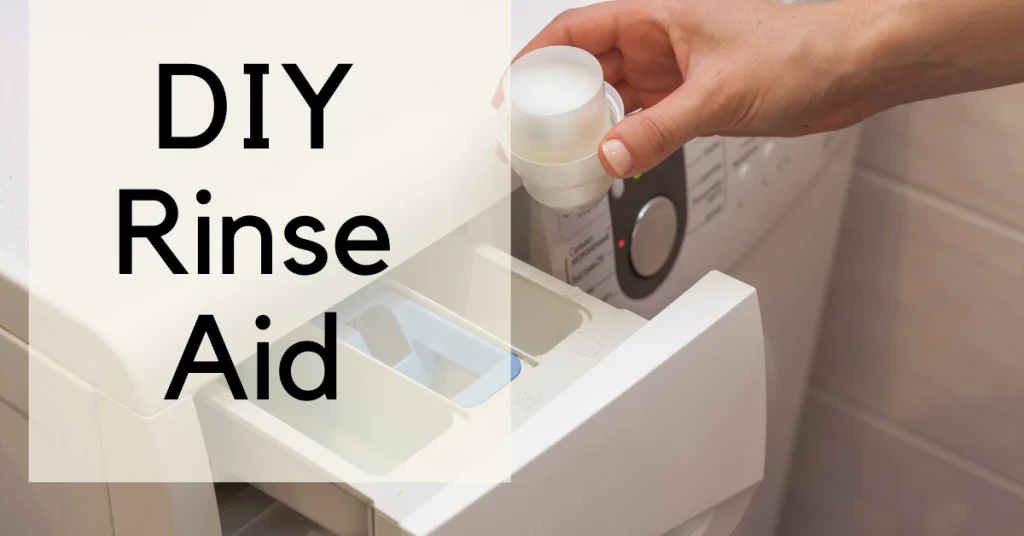
If you like to experiment and make your own cleaning products, here’s a simple recipe for homemade rinse aid:
- Combine 1 cup of distilled white vinegar, 1 tablespoon of citric acid powder, and 10 drops of your favorite essential oil. Mix well.
- Transfer the mixture to a glass bottle or jar with a tight lid to store.
- To use, add about 1 tablespoon of the homemade rinse aid to your dishwasher’s rinse aid dispenser before each wash.
- Remember to shake the bottle well before each use to ensure the ingredients are well mixed.
By using natural alternatives to commercial rinse aids, not only can you save money, but you can also help to reduce your environmental footprint and promote a healthier living environment for you and your family. Give these natural options a try and enjoy spotless, clean dishes without the need for harsh chemicals!
FAQ
What is a dishwasher rinse aid?
A dishwasher rinse aid is a liquid product that is used alongside dishwasher detergent to improve the rinsing and drying process. It helps to prevent water spots and streaks on dishes, glassware, and silverware.
Why should I make my own dishwasher rinse aid?
Making your own dishwasher rinse aid allows you to have control over the ingredients used, and it can be a more cost-effective option compared to store-bought products. Additionally, DIY rinse aids can be made with natural ingredients, which is beneficial for those who prefer eco-friendly alternatives.
What are some homemade dishwasher rinse aid recipes?
There are several homemade dishwasher rinse aid recipes you can try. One simple recipe is to mix equal parts of distilled white vinegar and water. Another recipe involves mixing lemon juice, water, and a few drops of essential oil like lavender or citrus. You can also try using a solution of baking soda and water as a rinse aid.
How do I use homemade dishwasher rinse aid?
To use homemade dishwasher rinse aid, simply fill the rinse aid compartment in your dishwasher with the homemade solution. If your dishwasher doesn’t have a rinse aid compartment, you can place a small cup or bowl filled with the rinse aid solution on the top rack of the dishwasher.
Can homemade dishwasher rinse aid be used with all dishwashers?
Yes, homemade dishwasher rinse aid can generally be used with all dishwashers. However, it’s always a good idea to check your dishwasher’s manual or manufacturer’s guidelines to ensure compatibility. Some dishwasher manufacturers may recommend specific rinse aids or advise against homemade solutions.











